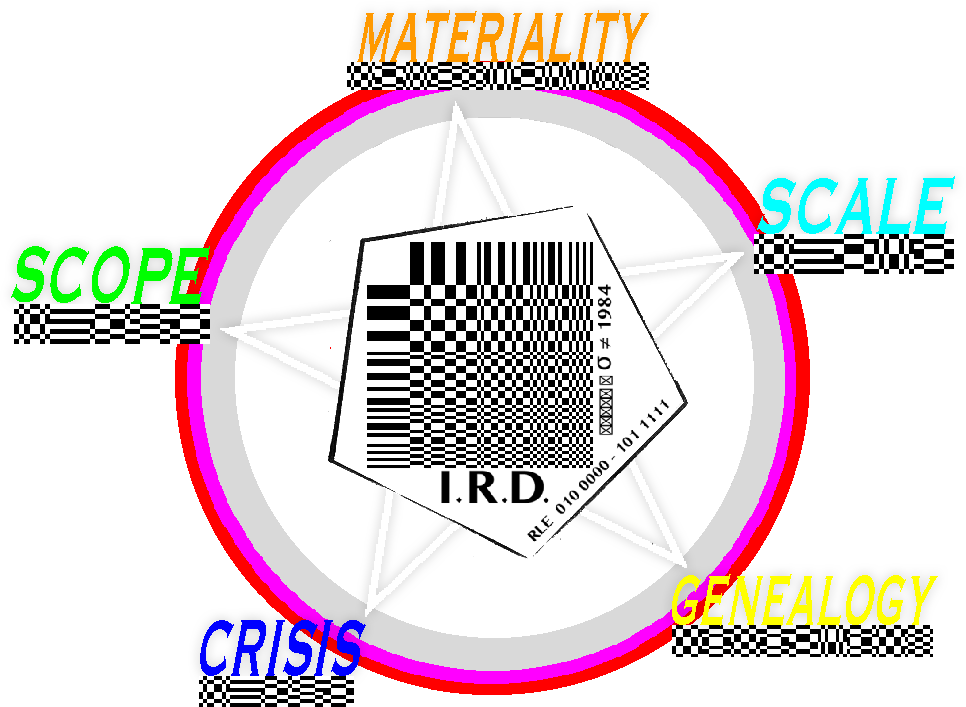MATERIAL: Bends and breaks, from Material Evidence to Material Index
Material, material specificity and materiality ---
WRITTEN (THEORY)
>>> Vernacular of File Formats [pdf] (2010 - ... )
>>> Sonification / Databending Workshop materials
>>>
ARTWORKS (PRACTICE)
>>> Videoscapes (2008 - ... )
>>> Un/Resolved (2020)
>>> Vernacular of File Formats (2010 - ... )
>>> Dear MR. Compression (2010)
>>> Monglot (glitch software) (2011)
>>> Extrafile vs Monglot (2011)
>>> Vernacular of File Formats [pdf] (2010 - ... )
>>> Sonification / Databending Workshop materials
>>>
ARTWORKS (PRACTICE)
>>> Videoscapes (2008 - ... )
>>> Un/Resolved (2020)
>>> Vernacular of File Formats (2010 - ... )
>>> Dear MR. Compression (2010)
>>> Monglot (glitch software) (2011)
>>> Extrafile vs Monglot (2011)
WRITTEN (THEORY)
ECOLOGY OF DCT MACROBLOCKS
>>> DCT: THE GUY BEHIND THE GUY BEHIND THE GUY (2015)
or: How Not to be Read (a recipe using Discrete Cosine Transform) [ pdf ]
ARTWORKS (PRACTICE)
>>> An Ecology of Compression Complexities (2017)
>>> DCT:SYPHONING. The 1000000th (64th) interval (2015 - 2017)
>>> DCT (CRYPTOGRAPHY) (2015)
>>> i.R.D. PATCH (with DCT key) (2015)
>>> JPEG (revision for Sotherby’s) (2023)
ECOLOGY OF DCT MACROBLOCKS
>>> DCT: THE GUY BEHIND THE GUY BEHIND THE GUY (2015)
or: How Not to be Read (a recipe using Discrete Cosine Transform) [ pdf ]
ARTWORKS (PRACTICE)
>>> An Ecology of Compression Complexities (2017)
>>> DCT:SYPHONING. The 1000000th (64th) interval (2015 - 2017)
>>> DCT (CRYPTOGRAPHY) (2015)
>>> i.R.D. PATCH (with DCT key) (2015)
>>> JPEG (revision for Sotherby’s) (2023)
- Schuppli, Susan. Dark Matters: an interview with Susan Schuppli, in: Living Earth, 2016.
“Materiality is reconceptualized as the interplay between a text's physical characteristics and its signifying strategies, a move that entwines instantiation and signification at the outset. This definition opens the possibility of considering texts as embodied entities while still maintaining a central focus on interpretation. It makes materiality an emergent property, so that it cannot be specified in advance, as if it were a pre-given entity. Rather, materiality is open to debate and interpretation, ensuring that discussions about the text's "meaning" will also take into account its physical specificity as well.”
- Hayles, N. Katherine. "Print is flat, code is deep: The importance of media-specific analysis." Poetics Today 25.1 (2004): 67-90.
A reflexive approach to materiality makes it possible to re-conceptualize materiality itself as ‘the interplay between a text’s physical characteristics and its signifying strategies’. Rather than thinking in the mediums’ material as fixed in physicality, a re-definition of materiality is useful because it opens the possibility of considering any text as embodied entity “while still maintaining a central focus on interpretation. In this view of materiality, it is not merely an inert collection of physical properties but a dynamic quality that emerges from the interplay between the text as a physical artifact, its conceptual content, and the interpretive activities of readers and writers.”
Reflections on materiality should not just happen on a technological level. To fully understand a work, each level of materiality should be studied: the physical and technological artifact, its conceptual content, and the interpretive activities of reader, artist and audience. [the choice of any] digital material is not innocent or meaningless. With enough knowledge of the material, an investigation into digital materialilty can uncover stories about the origin and history of the material, by others.
▁∣∖▁╱◝◟.❘╱▔▔╲̸/╲╱▔▔▔╲∣∖╱▔╲▁▁∣∖▁╱◝◟.╱▔▔╲________








